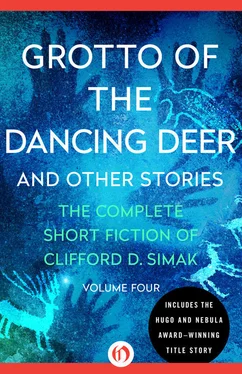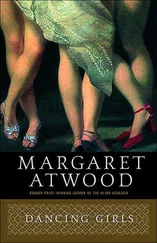“Tuesday is just fine,” Benton said. “Now get over on those scales.”
When Burt had gone, Benton walked out into the empty waiting room. “I guess that’s it for the day,” he said to Amy. “Why don’t you go home?”
Back in his office, he sat down at his desk and began filling in Burt Curtis’ record. Tiredness, intermittent and persistent hunger, gaining weight, sore muscles, irritability—all the symptoms Abbott had talked about that very afternoon. And then there was Herb Anderson as well. From what Helen had said, his condition seemed much the same as Burt’s. Both of them and Ted Brown, too.
What the hell, he wondered, could be going on? Abbott had said “epidemic.” But did three people in one little town add up to an epidemic? He knew, however, that once he had gone through his records, he would probably find others.
The office was quiet. Amy had left and he was quite alone.
From some distance off came the wild and frantic snarling of a racing motorcycle. Young Taylor, more than likely, he thought. Someday the damn fool kid would break his neck. Twice he’s needed patching up, and if he kept on there’d likely come a day when patching up would be superfluous—although, Benton told himself, that was no concern of his, or should be no concern of his. But the terrible thing about it was that he found himself concerned.
He was, he realized, concerned with everyone, too concerned with everyone in this silly little town. By what mysterious process, he wondered, did a man through the years manage to take an entire town to heart, shift its burdens to his back? Did the same thing happen to other aging doctors in other little towns?
He pushed Burt’s record to one side and laid the pen beside it.
He gazed about the room, shifting his glance from one object to another as if he were seeing them for the first time and trying to fix them in his memory. They had been there all the time, but for the first time he was noticing them, becoming acquainted with this environment in which he had lived and functioned through the years. Too busy, he thought, too busy and concerned to have ever looked at them before. The framed diploma, hung proudly on the wall so many years ago and now becoming fly-specked; the fading and worn carpeting (some day, by God, when he found the money, he’d have new carpeting put in!); the battered scales shoved against the wall; the sink and basin; the cabinet where he kept all the samples sent out by pharmaceutical houses to be given patients (and there were many of them) who could not afford prescription drugs. Not the kind of office, he thought, that a big-city doctor would have, but the kind he had—a combination of office, examination room, treatment room—the hallmark of the family doctor always strapped for funds, hesitant to send out bills that would embarrass patients he knew were short of cash, trying to treat people who should go to specialists but who could not afford their fees.
He was getting old, he told himself—not too old yet, but getting there. There were lines upon his face and gray showing in his hair. There would come a time, perhaps, when he would have to take in a younger doctor who, hopefully, could carry on the practice when he would have to retire. But he shrank from doing so. He was jealous, he knew, of his position as the town’s one doctor, even though he knew it was most unlikely the town would accept anyone that he brought in. Not for a long, long time would they accept anyone but him. Patients would refuse to see the new man, waiting for Old Doc. It would take years before he could shift any appreciable percentage of his patient load.
Over in Spring Valley, Dr. Herman Smith had a son who was in internship and who soon would join his father. Slowly, over the years, young Doc Smith would phase out old Doc Smith, father followed by the son, and there would be no hassle. Oh, some hassle, surely, but none that would be noticed. That, Benton told himself, was the ideal method of succession. But he and Harriet had never had a son—only the one daughter. He had hoped, for a time, he recalled, that April might want to be a doctor. But that would have posed problems, too, for it would be unlikely the town would accept a woman doctor. The problem, however, had never arisen, for April, it turned out, had been big on music and there was no stopping her. Not that he had ever wanted to. If music was what she wanted, then it would be music. She was in Vienna now. Christ, these kids! he thought. The world belongs to them. Off to London, Paris, Vienna, and God knows where else, with no thought that it was extraordinary. In his youth, he recalled, it had been a big adventure to get a hundred miles from home. And, come to think of it, even now he seldom got more than a hundred miles from town. He stuck close to his work.
I’m provincial, he thought, and what was wrong with that? A man could not encompass the world. If he tried, he would lose too much. Friends and familiarity of place, the warm sense of belonging … Since he had come to this town, many things had happened to him—good things—with quaint little privileges established. Like old Ezra Pike and his annual crop of pheasants reserved for good old Doc and a few others in the town, and for no one else.
He sat in the office and tried to peel the years away, back to the time when he had first come here; but the years refused to peel and the diploma still was fly-specked and the scales still battered and he remained an aging man who carried the town upon his back.
The phone rang and he picked it up. It was Harriet.
“When are you coming home?” she asked. “I have a leg of lamb and it will be ruined if you don’t get here fairly soon.”
“Right away,” he said.
2
The next day was Saturday and office hours were from eight till noon. But, as was usually the case, the last patient was not gone until after one.
Once the waiting room was cleared and Amy had gone home, Benton got to work on the files. He went through them carefully, making notes as he went along. He didn’t finish the work on Saturday, and came back Sunday morning.
Going back through ten years of records, he was able to isolate some trends. There had been, in those years, a substantial increase in the symptoms Abbott had outlined. The incidence of obesity had risen rapidly. In more instances that he had recalled, the high level of blood sugar had indicated diabetes, but further tests had inevitably failed to bear out his tentative diagnoses. There had been, increasingly, a spate of muscular soreness. There were an increasing number of patients who had complained of general malaise, with no apparent cause.
Most of the symptoms were found in townspeople. Among the farm families, only the members of one family, the Barrs, had experienced the symptoms. The Barrs, about three years before, had come from somewhere in Ohio, buying the farm of Abner Young, a recluse who finally had died of old age and general meanness. And not a single case with those symptoms showed up among the hill people.
Maybe, after all, Benton told himself, geography might be a factor in Abbott’s epidemic—if there were an epidemic. But if some of the townspeople had the symptoms, why not all of them? If farmers were immune, as seemed to be the case, what about the Barrs? What was different about the Barrs? Recently arrived, of course, but what could that have to do with it? And what was so magic about the hills that in all the hill folk no symptom had turned up? Although, he reminded himself, he should not assign too much weight to the negative data from the hills. The people there, a hardy tribe, would not deign to visit a doctor for such minor reasons as being unaccountably tired or putting on some weight.
He pulled the sheets of notes together and, searching in his desk drawers, found some graph paper. The graphs, when he had them drawn, showed nothing more than he already knew; but they had a pretty look to them and he found himself imagining how they would look printed on the slick paper of a prestigious journal, illustrating a paper that might be entitled “The Epidemiology of Muscular Exhaustion” or “The Geographical Distribution of Obesity.”
Читать дальше












